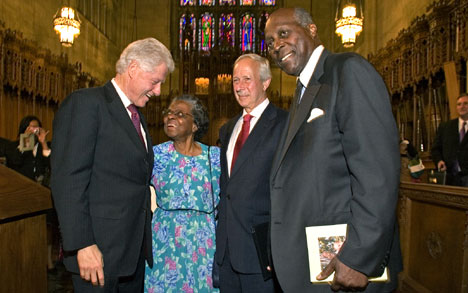
John Hope and Aurelia Whittington Franklin were remembered Thursday as "our American royalty, our symbols of goodness," in the words of Mary Duke Biddle Trent Semans, who joined former President Bill Clinton and other speakers in celebrating the couple's legacy before an overflow audience in Duke Chapel.
John Hope Franklin "was a genius in being a passionate rationalist, an angry happy man, a happy angry man," said Clinton, who awarded the historian the Presidential Medal of Freedom and appointed him to lead a national initiative on race. He called Franklin a "remarkable man of astonishing dignity and determination" who persevered in the face of adversity to help transform how Americans understand their history. "He was a very great man, a teacher, a magnificent historian and, I can say from personal experience, tough in the trenches of political struggle."
The former president's remarks capped a series of reminiscences by speakers who grew up with the Franklins, raised families with them, pursued academic careers together or joined in struggles to overcome racism and expand the narrative of American history. John Hope Franklin was "a teacher who taught us to believe in the shield of justice and the sword of truth," said Vernon Jordan, the lawyer and business executive, whose remarks drew such applause in the chapel that his friend Clinton opened by joking, "Vernon, you did everything but pass the plate. There's not much left."
Duke President Richard Brodhead noted how he was born the same year Franklin published the first edition of his most famous book, From Slavery to Freedom. He said he established a warm friendship with Franklin after he assumed Duke's presidency in 2004, getting together at each other's homes to discuss everything from Southern history to the latest political events. Even as Franklin aged into his 90s, "he always seemed to be right there, fully present in the moment of our encounter," said Brodhead, who praised Franklin's "absolute human decency."
Semans marveled at the "unique positivism" of Franklin, with whom she served on the board of The Duke Endowment and elsewhere. She urged the audience to remember how he "never stopped fighting for equality, fairness and peace."
Visitors from the local community and beyond attended the two-hour celebration, which was hosted by the couple's son, John Whittington Franklin, who also took the lead in organizing the program with his wife Karen Roberts Franklin. The chapel reached its capacity of around 1,600 people well before the 11 a.m. ceremony began, leading officials to send about 850 people to watch a telecast in Page Auditorium. The ceremony was also broadcast on WUNC-TV and streamed on the Duke website, accompanied by a Twitter feed where viewers shared observations. (The video of the full ceremony can be viewed here).
The ceremony began with a remembrance of Aurelia Franklin by her former colleagues in the Links Inc., an international women's service organization whose members wore white dresses that matched large bouquets of flowers decorating the chapel. They were followed by the Fisk Jubilee Singers, who sang four times during the ceremony, which also featured violin and trumpet solos composed in the Franklins' honor by T.J. Anderson. Both of the Franklins attended Fisk University.
The first speakers remembered the couple's early years and family life. A niece, Cynthia Gibbs Wilson, described the "deep quiet power" of her Aunt Aurelia, and John Hope's childhood friend Vivian Mildred Corbett Bailey joked how she was "determined not to like" Aurelia because she took John Hope away from his home town of Tulsa, Okla. Bailey said that brief emotion quickly gave way to a lasting friendship with Aurelia. She and others also described John Hope's love of cooking and passion for orchids.
Emily Mann, whose father was a fellow historian at the University of Chicago, described the Franklins as her second family. Genna Rae McNeil, a professor of history at the University of North Carolina at Chapel Hill, spoke for John Hope Franklin's graduate students in recalling how "he modeled intellectual confidence and poise" and, with his wife, provided limitless personal support. As a scholar and mentor, Franklin had "perfect historiographic pitch," said David Levering Lewis of New York University.
Evelyn Brooks Higginbotham of Harvard University, Franklin's co-author on recent editions of From Slavery to Freedom, said he insisted on the highest standards of scholarship even as he struggled for social change. "Until the day he died, he was an unwavering champion of justice and equality," said Higginbotham, who said Franklin "lived long and well, and in the process made our country better."
Thavolia Glymph, a historian at Duke, put it more simply, saying, "We are all here this morning because we loved John Hope and Aurelia."